Since UC Libraries announced the establishment of UC’s first Digital Scholarship Center (DSC) last September, the center’s co-directors Arlene Johnson and James Lee have been busy reaching out to the university community and laying groundwork. We sat down with both them and Dean Xuemao Wang to discuss their respective backgrounds in digital humanities/digital scholarship (DH/DS) and the early details of their plans for the DSC at the University of Cincinnati and UC Libraries.
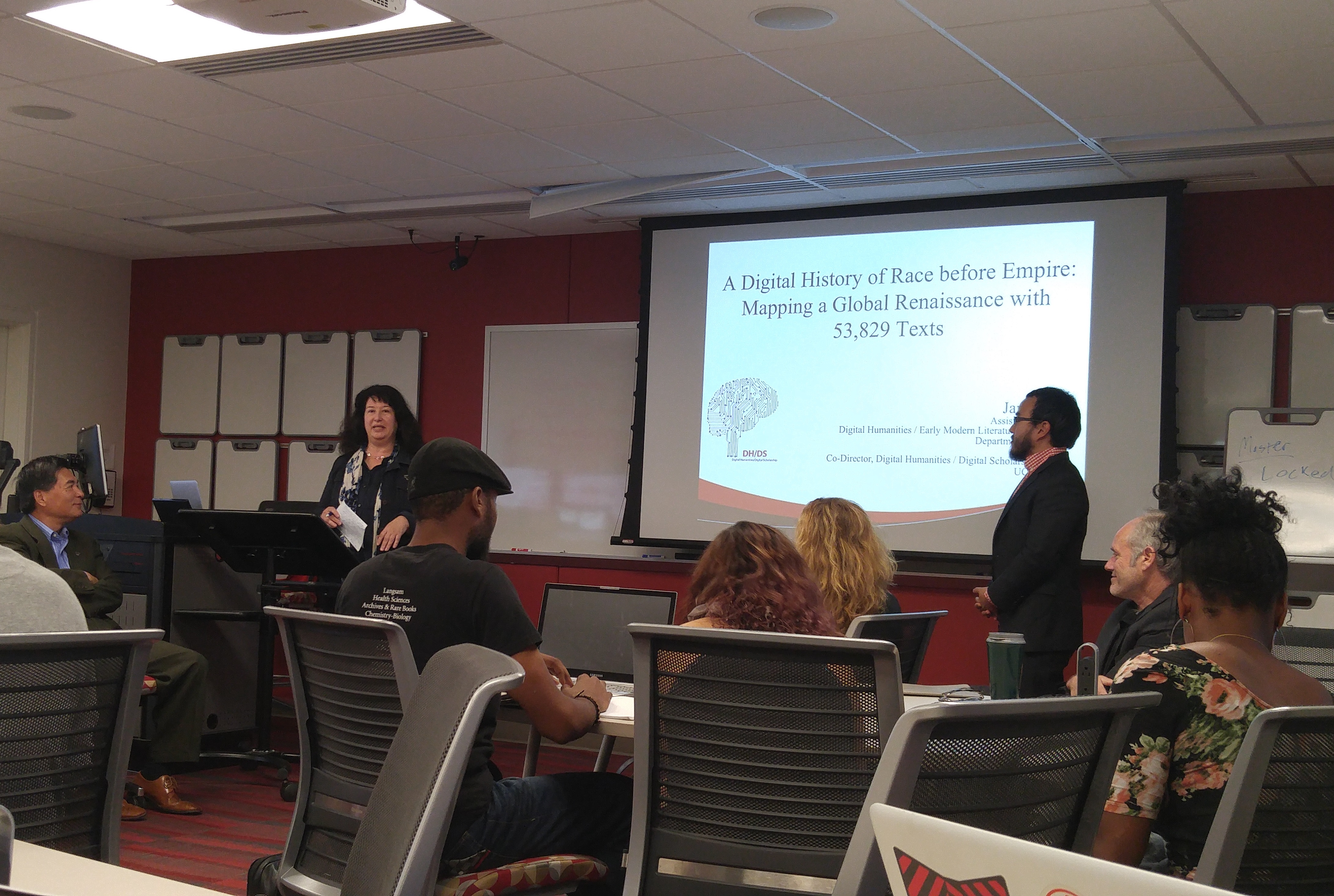
Arlene Johnson introduces Dr. James Lee at his DH/DS talk
When did you first become interested in Digital Humanities and Digital Scholarship?
Xuemao Wang– To start I would say with my previous job at Emory University, when I was the Associate Vice Provost for library operations. I was deeply involved in the creation and execution of Emory Library’s digital direction and vision. Part of that were Emory’s digital humanities and digital scholarship pursuits. We were successful getting an Andrew W. Mellon grant and we made ourselves, at that time, one of the visible DH/DS pioneers in the country.
About the time I was leaving Emory to come to UC, I joined a group of co-PIs and we received Mellon funding for a global digital humanities, digital initiatives, core competencies investigation project. That’s where I was able to be involved beyond what was happening in the US and North America in the DH/DS pursuits and best practices, particularly with a focus on core competencies. That’s where I started.
Arlene Johnson– In terms of Digital Humanities, in 2011 I developed a proposal for my sabbatical. That proposal was successful and accepted by Santa Ono, then Provost. In 2012 I took my sabbatical, at the very onset of Dean Wang’s tenure. This was my first chance to really delve into digital humanities and research this field.
In my sabbatical work I was also looking at the role of the liaison, a librarian working with an academic department: How could this change? What were the new challenges? How could we, as librarians in this liaison role, have a deeper connection with the academic departments we worked with, in terms of research and scholarly work? The digital humanities fit quite nicely into that part of my research, as well. I also considered how we could be successful in the digital humanities at UC Libraries and UC. For part of my sabbatical work I looked at different possibilities at institutions in the United States and in Canada. I saw that some of the most innovative work was being done at the smaller institutions, not always the large universities. That was very exciting, and I decided we had a lot of possibility for DH/DS at UC Libraries and UC. That was the beginning of my interest in DH/DS. In the summer of 2013, while still on sabbatical, I attended my first international digital humanities conference, the Alliance of Digital Humanities Organizations (ADHO) conference, held in Lincoln, Nebraska. I also attended my first THATCamp (The Humanities And Technology Camp) http://thatcamp.org/ event that summer. I was able to develop and build relationships in the field of DH through attending those conferences. Then, in 2014, I had the wonderful opportunity to lead the DH/DS strategic initiative at UC Libraries.

Dr. James Lee, Co-Director of the Digital Scholarship Center
James Lee– I think that my interest reflects my somewhat unconventional academic training. The way I’ve put it in the past is that I was accidentally cross-disciplinary. My graduate training is in Renaissance English Literature, which is a very historical field focusing primarily on the time of Shakespeare. But before my graduate training, I was a student and researcher in the field of molecular biology and genetics. I worked in many labs in that field, and I’ve published my research in both. For the longest time I thought that the literary and humanistic, and the scientific and technical parts of my brain were unconnected, but in this academic context, DH has emerged now as a new field. I can dust off my previous scientific and technical training and merge the different parts of my brain to participate actively in this new field of DH/DS. UC is a great place to begin to make that happen.
How is the library uniquely suited to support DH/DS?
Xuemao– To answer this question, I would like to start with the library’s role historically in the past, today in our present, and in our future. The library has always played a strong role in the academy and campus. It’s part of the core academic unit and serves closely with the university’s three pillars: teaching and learning, research, and community engagement. When you look at the library’s structure, from our subject liaisons to our digital repository to our space renovation, it’s all connected to this role, to serve the academic core.
Moving forward in this university library system, we, since I joined here, we collectively decided we wanted to pursue our shared vision, a bold one, to have our university library system become the globally engaged intellectual commons, the center hub of the university. When you think about an intellectual commons, or the library’s and librarian’s role that I just mentioned, it’s easy to understand why the library is in a unique situation, to connect with this digital humanities and digital scholarship pursuit, which by nature is very interdisciplinary and intercollege and interdepartmental. That’s how I see the library play a unique role in DH/DS.
Arlene– The library is also often perceived as a neutral place on campus, so we can play that role in terms of functioning as broker or connector, bringing together different disciplines and departments on campus. I really think that, over the long view of time, we are tremendously well thought of on campus; the library is a respected entity on campus. We’ve been involved in other efforts and many collaborative projects over time and I think there is trust there, that we will be good partners and do excellent work together.
James– First of all, I have to say that UC Libraries are unique. I’ve worked with libraries in the past at previous institutions and I think that, under the leadership of Dean Wang, there’s a very different model of what the center can be and how the library functions on campus. It’s dynamic and scholarly, with a forward thinking and innovative vision. I’d like to echo what both Xuemao and Arlene have said about the neutrality of the library, beyond the “turf” of any single discipline or department. I think it’s good for scholars, students, and all of our different stakeholders to leave their buildings, leave their offices, and go to an unfamiliar place. That unfamiliarity is good; what people need is surprise to spark innovation. I’m not sure if “surprise” is a word often thought about in terms of libraries but, in graduate school, one of my advisors gave me some fantastic advice when I was working on my dissertation. It was to go to the libraries, and if there’s a book you’re going to find, look at that entire shelf and just start scanning the titles, and you might be surprised. You might, through serendipity, find a book that might be important for your project in an unexpected way. We hope the center and the library, in the digital era, can promote the kind of intellectual surprise that may force you to challenge your field’s assumptions or spark a new line of thinking. These moments of intellectual surprise improve your research going forward. We want to recreate the surprise and serendipity of “wandering the stacks” as a digital experience with the Digital Scholarship Center in the library.
UC Libraries first began exploring DH/DS as one of its strategic initiatives, part of the libraries’ Strategic Plan. How did you go about developing your initiative?
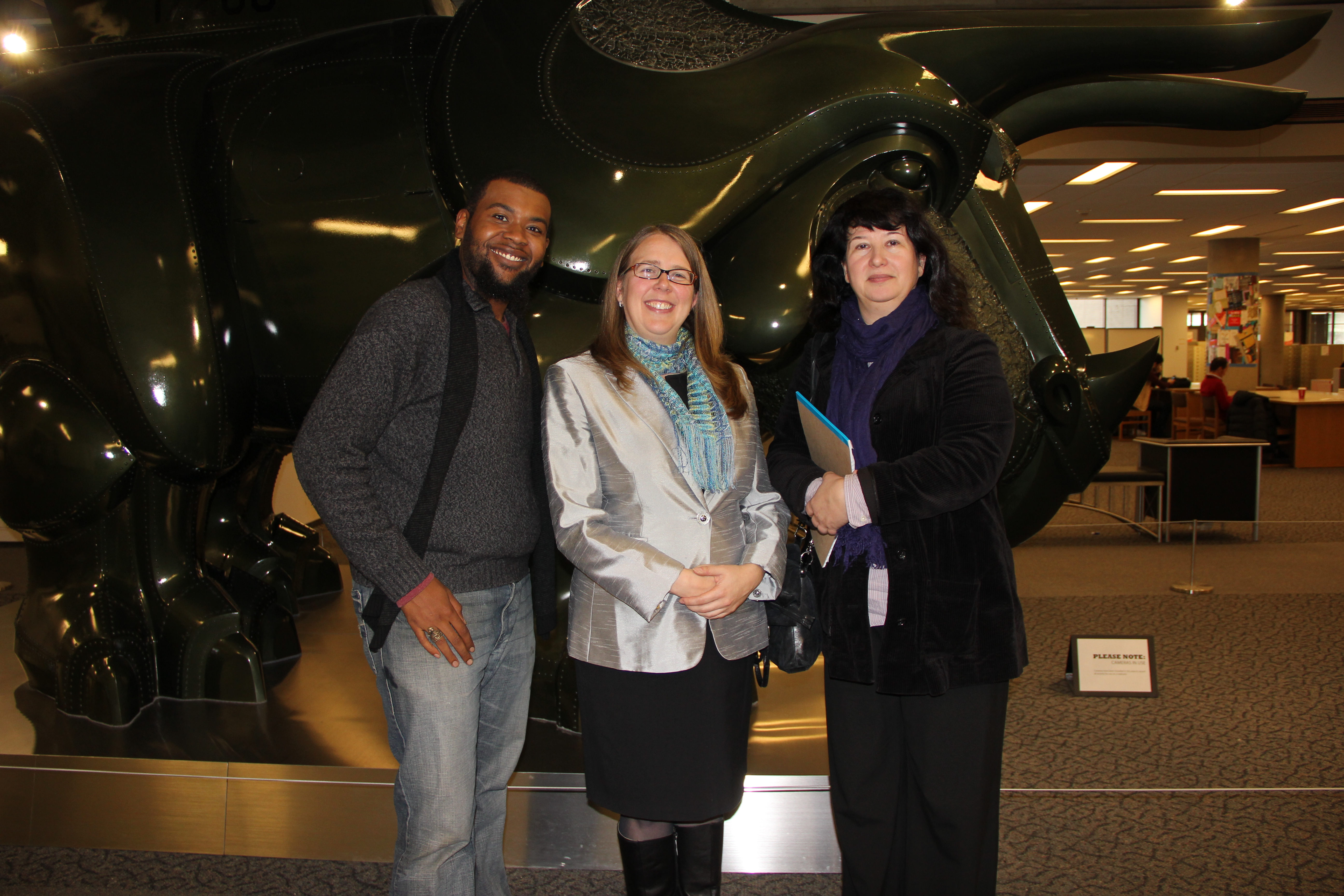
Arlene Johnson with UCL’s first DH/DS Speaker, Lee Skallerup Bessette (center)
Arlene– Working with Dean Wang and former Associate Dean Cheryl Albrecht, the co-sponsors of the DH/DS strategic initiative, I was able to exercise the needed latitude for creativity to develop the initiative, and really, creativity was what was called for. At the core of what we were trying to do in that very early time was to develop a series of learning opportunities and events. We developed the Digital Humanities Speaker Series, bringing international DH scholars to UC. This created a lot of energy and excitement around the digital humanities. Another learning session that we had in that first year was a virtual session with Dr. Raymond Siemens, the director of the Digital Humanities Summer Institute at the University of Victoria and an eminent scholar in the digital humanities. We definitely had a high level of engagement and enthusiasm in this session with Dr. Siemens among the members of the DH/DS Strategic Initiative Group present. We also had Dean (of Arts & Sciences) Ken Petren join in on this session. Also, I was able to apply for an Interdisciplinary/Group Faculty Development Award, funded by the office of the Provost, so that a cohort of faculty from UC were able to attend the DHSI as a group. All these learning events, opportunities and funding support have been a sort of scaffolding for our DH/DS work here at UC Libraries and UC. We have been able to build on some successes, with relationship building as a key component.
That’s a good segue way into the next question: How did you identify your collaborators, both in and outside of the library?
Arlene– It was clear from the very beginning that this particular strategic initiative had to be very outward looking from the library. I endeavored to make that happen, and was able to reach out to other people on campus based on the relationships I had formed in my work as liaison to the Romance Languages department in A&S, and also my longstanding work in Faculty Senate. Some key early collaborators (were) three department chairs in A&S: Jay Twomey, Todd Herzog, and Carlos Gutiérrez. Also department chairs Jeff Blevins in Journalism and Richard Harknett in Political Science, and Arnold Miller, who is now the Senior Associate Dean in A&S. So it was early on engagement and support from leaders in A&S, in particular, and also other faculty members that I had worked with in Faculty Senate who were keen to find out more about (DH/DS), many wondering What is this Digital Humanities thing all about? Jane Combs, Asst. Director IT@UC Research & Development, Innovation & Partnerships, was another early collaborator. We’ve had some excellent students in this Strategic Initiative group- Andrew Bales and Janine Morris, both from the English department, and Camilo Galeano from Romance Languages. Having the students there, undergraduate and graduate students, to really talk about DH/DS amongst their peer group, to bring them into these learning opportunities, has really been just tremendous.

At a session with DH/DS scholar and speaker, Alex Gil
On the library side, some early members of the Strategic Initiative group and strong supporters included Kevin Grace, Elizabeth Meyer, Jen Krivickas, Mark Palkovic, and Linda Newman. There were some excellent early and ongoing collaborations going on within UC Libraries.
What is your vision for DH/DS at UC?
Xuemao– My vision for the center is- I want this University of Cincinnati DH/DS Center to become one of the most unique, innovative, impactful and outstanding centers, which fulfills our hybrid model as both an academic scholarship center, and an enabling, incubation center.
At what point did you determine that another position would be necessary to further your DH/DS efforts and how did that position evolve into the co-director/joint-hire position James occupies? What was the significance of that collaboration with the College of Arts & Sciences?
Xuemao– This (James’) position is part of the plan to execute my vision. Talking about the hybrid model, thinking of academic scholarship and enabling and incubating, to do that, I need both the library side of expertise and the academic side of expertise. This is where we decided, working with A&S together, particularly the English department, the academic side of expertise would come from teaching faculty. Now we are very pleased to recruit and hire Dr. James Lee here, on the academic side. On the library side, you heard from Arlene Johnson, she has been working so effectively to engage the community. We want the library and the library’s expertise to become part of the center. The co-director position is not accidental, but rather a carefully planned position to create a structure to fulfill our plan to work as a hybrid. The significance of our partnership is because I don’t want the center to be perceived as the library organization. It is hosted in the library, embracing and incorporating library expertise, but this is a fully-fledged, approved by the Provost, academic center.
Speaking of the new co-director, James, what attracted you to UC and the joint-hire position?
James– First, the joint nature of the position really intrigued me. I have seen DH positions housed within academic departments before and also positions housed fully within libraries. As Xuemao mentioned before, my job description builds in a truly hybrid structure, bridging the College of Arts & Sciences, the English department and the libraries, so that was appealing to me. And it didn’t seem like a token gesture or just a joint position in name. Here it seemed like I could retain my identity as a literary scholar and a productive teacher and researcher in Shakespeare and the world of English literature.
Also, I was given some interesting opportunities with the co-directorship of this center. It was clear to me when I arrived on campus that Xuemao had a particularly clear vision for the library. In our initial discussions I was very engaged and excited by that. I also found the possibility of working with Arlene appealing. I interacted with Arlene extensively during the search and interview process and it was clear to me she had done a tremendous amount of work creating a culture of digital humanities and digital scholarship already at UC. She helped build the foundation for what the center will need to do. Building a culture of curiosity and inquisitiveness and openness to digital humanities and digital scholarship is the hardest thing to do. Once you have that open-mindedness and people are willing to task some risks and experiment with these techniques, there is so much you can accomplish. So I was impressed by all the work Arlene had done to overcome this initial hurdle. Finally, the urban nature of UC. I’m committed to social justice work in my research and teaching and it seems like, with UC’s campus embedded in an urban setting like Cincinnati, we could reach out past faculty, staff and students and into the community. I looked forward to working at a public, urban school.
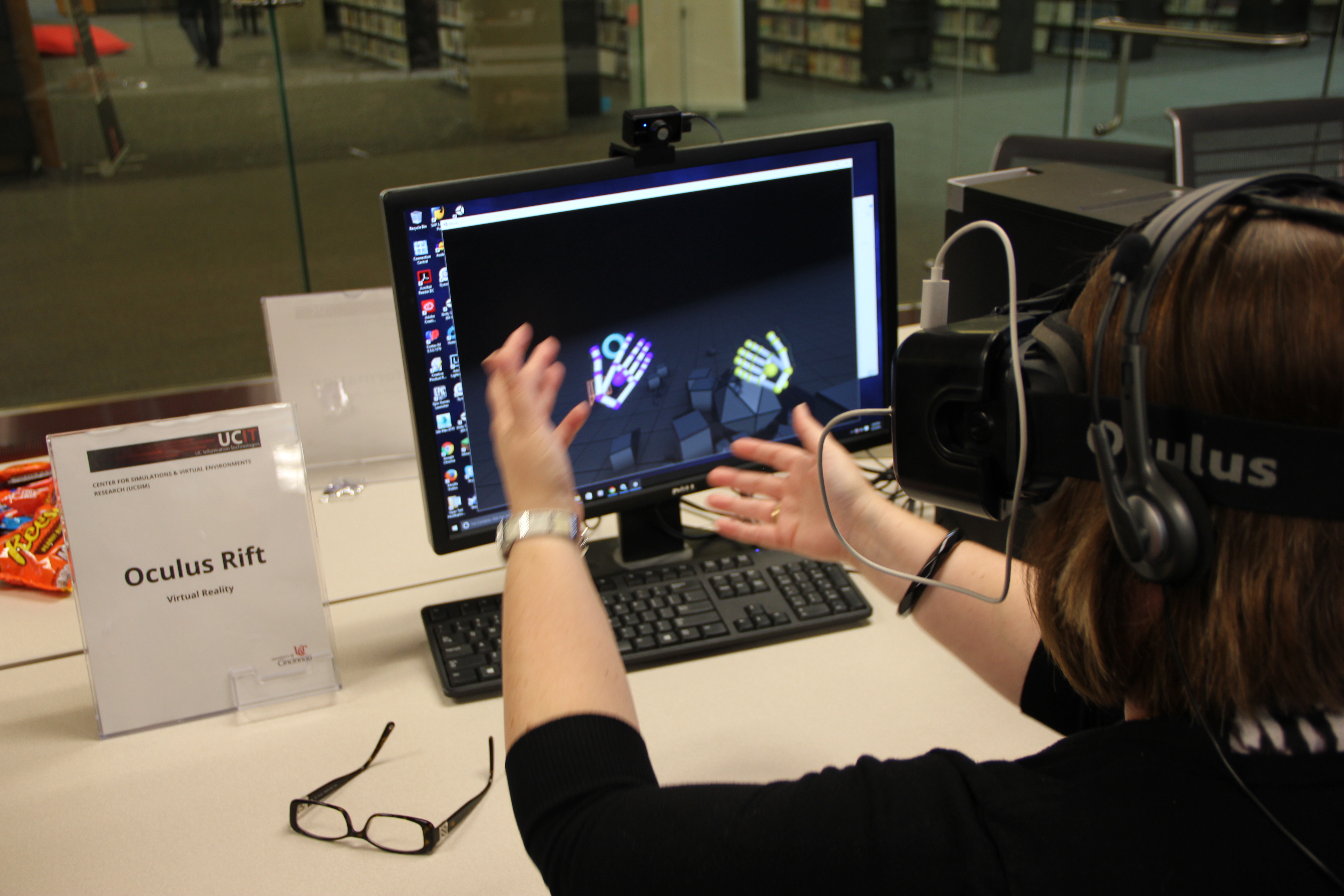
Testing virtual reality technology at UCL’s THATCamp
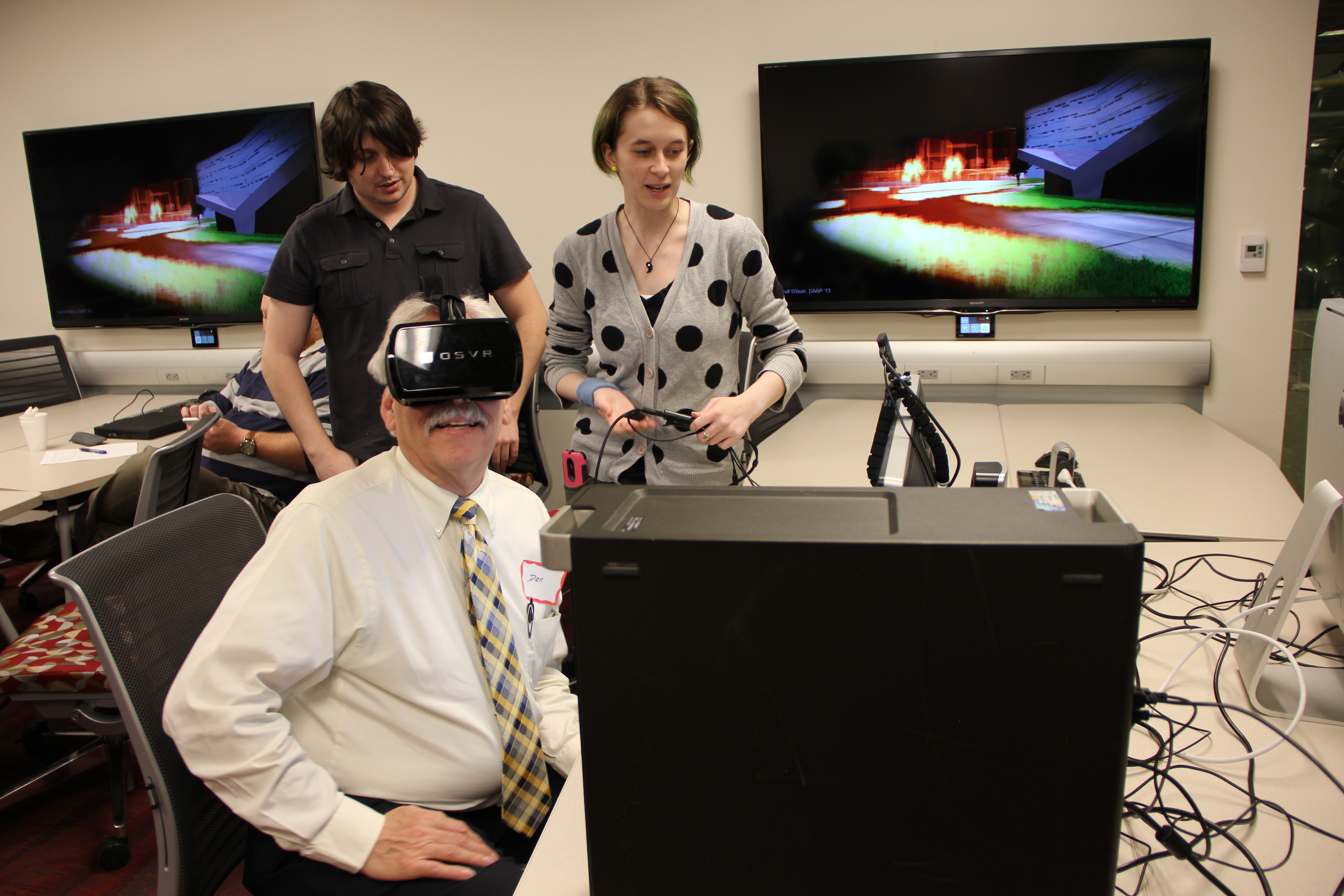
What is your mission for DH/DS at UC?
James– I want to a build off this foundation Arlene has laid, in terms of creating a culture of curiosity. There’s a lot of curiosity about what is DH, what is DS, and what do we do next. We want to be a spark or catalyst, bringing people from an area of curiosity and open-mindedness to actual products. The mission, in a nutshell, would be moving from all this interesting potential around DH to a set of concrete products, and those products will be different for every stakeholder that we encounter. They might be teaching modules and curricular innovation for some faculty and students; it might be research articles and thinking about how we can help them with their research projects with others; or it might be programmatic- there might be departments or different groups on campus who might want to have a colloquium or organize events around DH to expose students to digital scholarship. Across this entire range we want to be that catalyst, moving from the foundation of inquisitive potential to a set of academic products. In order to do that, we’re beginning to scaffold the technology and talent, the personnel and expertise, to actively collaborate with a wide range of scholars, students, faculty and staff across campus. So to get off the ground, we are working in our first year on some pilot projects, to show DH in action, to embody how we want to move from potential to product.
Arlene– Underscoring all the aspects that James has outlined is our really strong commitment to diversity in digital humanities and digital scholarship. It’s very exciting because we now have two graduate students working with us, so we’re already seeing this in our early work as we gear up for the actual, physical center that will be in place in January or February of 2017. But we’re really committed to diversity in DH; we talked about that quite a bit, so it’s very important to us.
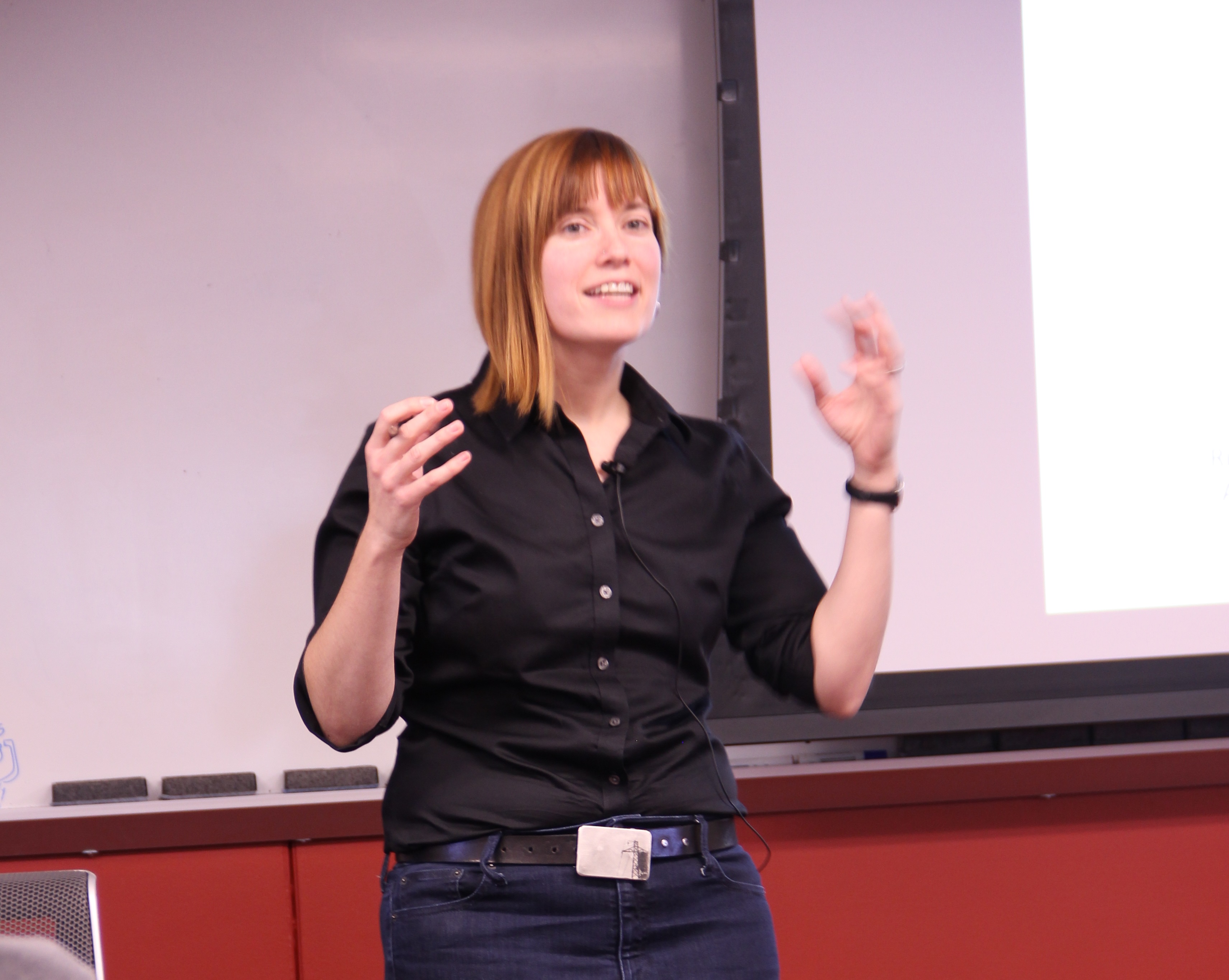
DH/DS Speaker Constance Crompton
How will the DSC benefit UC’s students and faculty, and contribute to the university’s mission of teaching, learning and research?
James– As Xuemao mentioned, the center’s scope from the outset is purposely focused along the three axes of the university’s mission of teaching and learning, research and service. I have seen DH/DS Centers that were very narrowly focused on one of these items, but we want to be able to blend them in a cohesive and integrated way. For teaching, to give you some concrete examples of that, we want to equip students of all majors with skills and techniques to enter the world, whether it’s the work space or our information saturated world today. They need the ability to work with data and technology, and not just STEM majors – but students in DAAP, at the music college, or students that are English majors that don’t normally think of their work and what they’ve learned at UC as being focused on data. We want to give them the capabilities to begin to think about how their intellectual training can engage with technology and data in a nuanced way.
In terms of research, to give you some examples, what we want to do is gather unconventional teams of faculty and students that wouldn’t normally collaborate with one another. For example, one project is on a poetry archive with creative writers, poetry scholars and faculty working on machine learning techniques on sound; we have a twitter social justice project with a law professor and a journalism professor; we’re working with a plant genetics lab. So what we’re doing is leveraging our technology and the expertise that all of these faculty members have in order to see what sparks fly when you place different disciplines into contact and see what new narratives we can articulate about questions that cross over between disciplines. And as Arlene mentioned before, all of these projects are unified by a focus on social justice. So when we think about benefiting students and faculty, and the university’s mission, what we want to do is make sure we move beyond technology for technology’s sake, from the simply cool or novel elements of the digital humanities to actually using these tools and techniques to make a difference out there, to enter the fray, in terms of social justice movements and social justice narratives.
Arlene– Building on what James has said, working DH with the soon to be physical center located in Langsam Library, we can really contribute to one of UC’s main goals, in terms of reimagining the student experience on campus. Not all students will have careers in academia, they may have other careers, and some of the learning and skills that we’ve been discussing will hold them in good stead for whatever their career opportunities will be. It seems that there is a real thirst for this on campus at UC.
What are your short and long term goals? What are you looking to achieve?
Xuemao– From my point of view, I would hope the center focused on the following things: communicating their vision and mission, and their short, mid and long term plans. This includes things such as their website, mission statement, and community engagement to the university community and beyond to understand what DH/DS is all about. Secondly, they need to build their infrastructure, including their space and staffing. Third is to get resources; applying for grants, or discussing with senior management in our organization how to borrow expertise and collaborate with others to increase their resource base. Last but not least, they need to get all of this organized and start to make an impact and deliver things they can define in short, mid and long term goals.
Arlene– One of our important ongoing goals, but very important in the shorter term, is to engage in a very consultative process. We’ve been doing a lot of work in that regard because that’s our goal, to really listen to people’s thinking on DH/DS. Another short term goal, as Xuemao mentioned, is the space, and that’s coming on board early into the New Year. That will be wonderful, to have a space, a home, and we really look forward to that. Longer term, to build our program funding sources will be essential.
James– We want the Digital Scholarship Center at UC to be a well-known center of excellence, to be a national hub for innovative digital research and teaching. In order to do that I think, down the line, we’ll have to make some form of digital humanities/digital scholarship curriculum, whether it’s a certificate program or some kind of teaching initiative that can really learn from best practices across the nation. The second thing, we need to build a track record of research, whether that includes publications, grants or conference papers, we need to get our research findings out there. So in order to be a nationally recognized hub for digital work, we need to flip the dynamic from learning from others and following trends in the DH world to actually creating the trends, being the vanguard, at the cutting edge. I think we’re at that point of inflection, and the next couple of years we’re really poised to make that sort of reversal.
